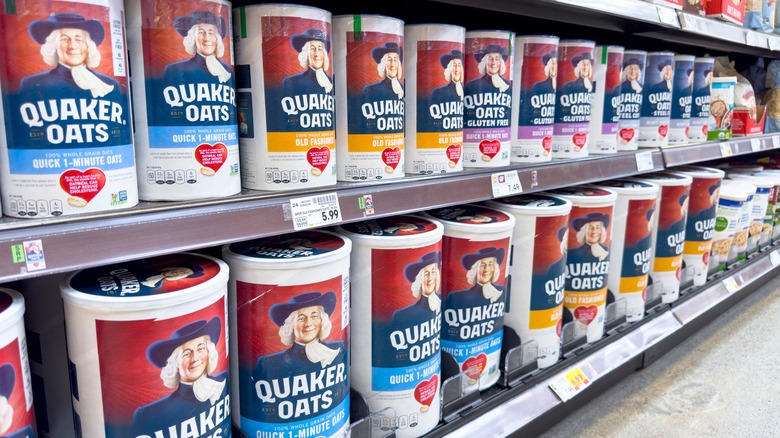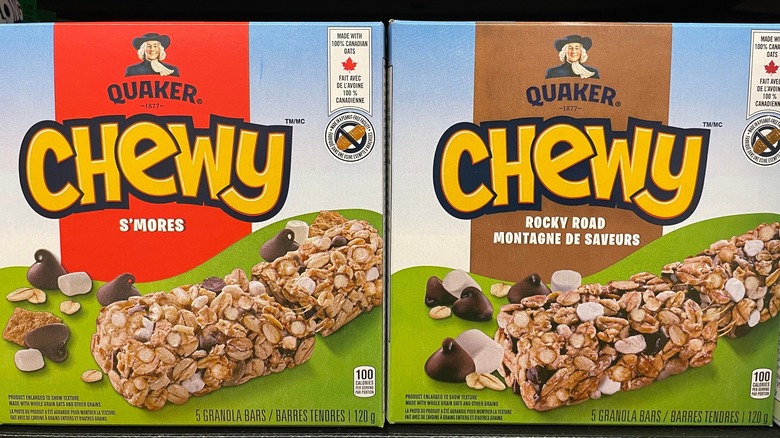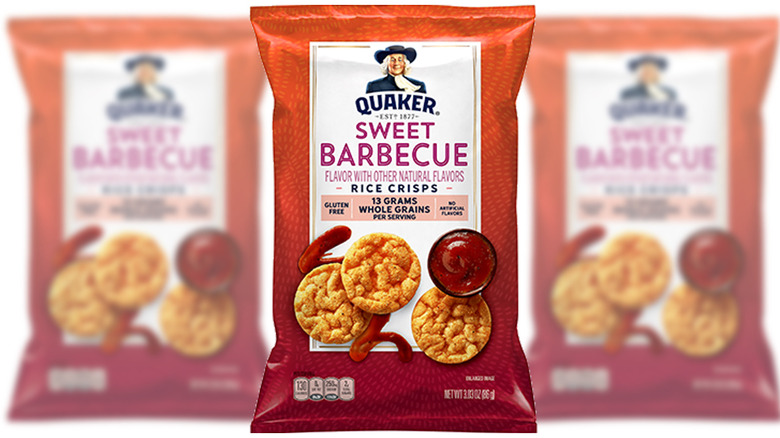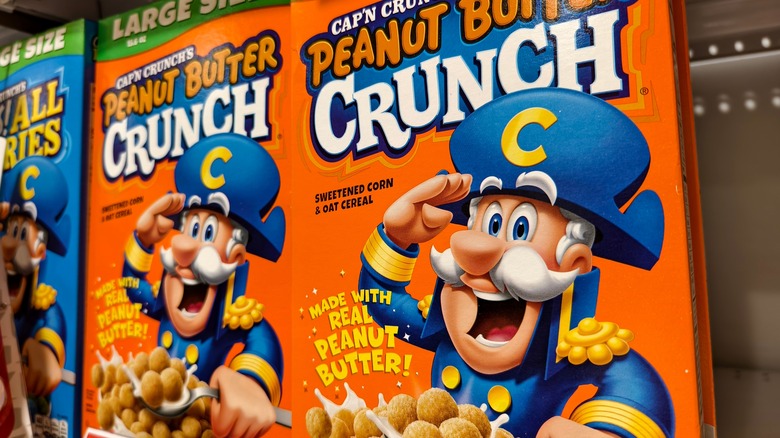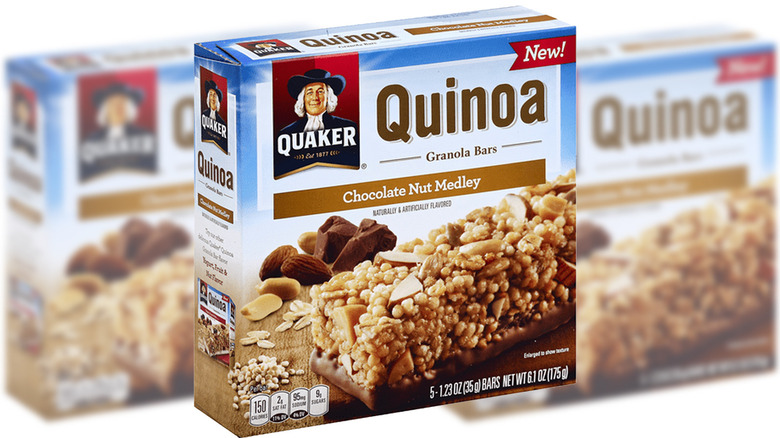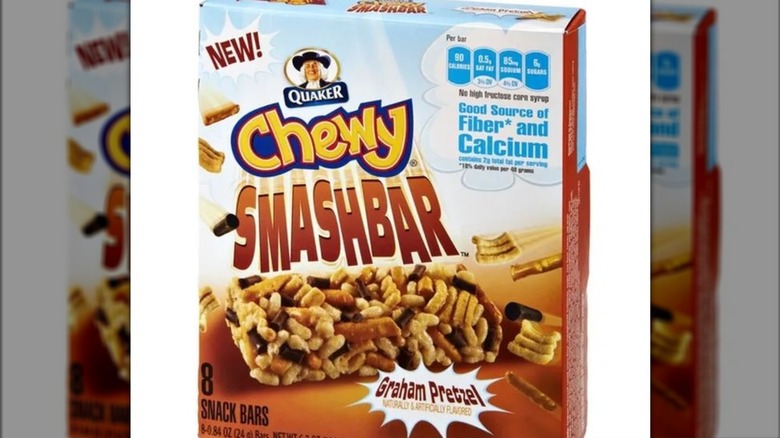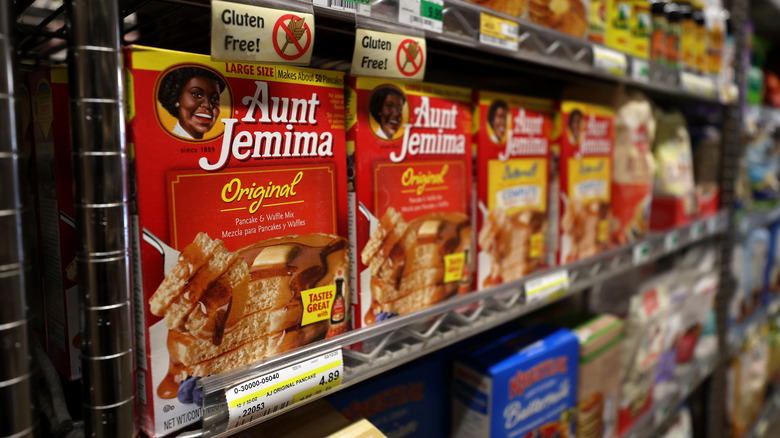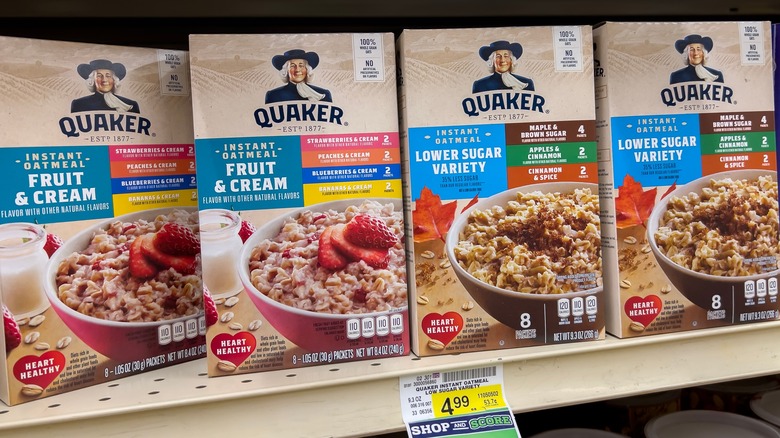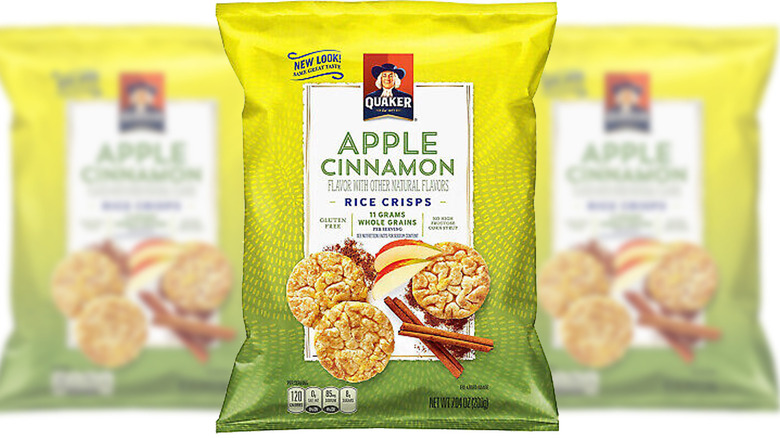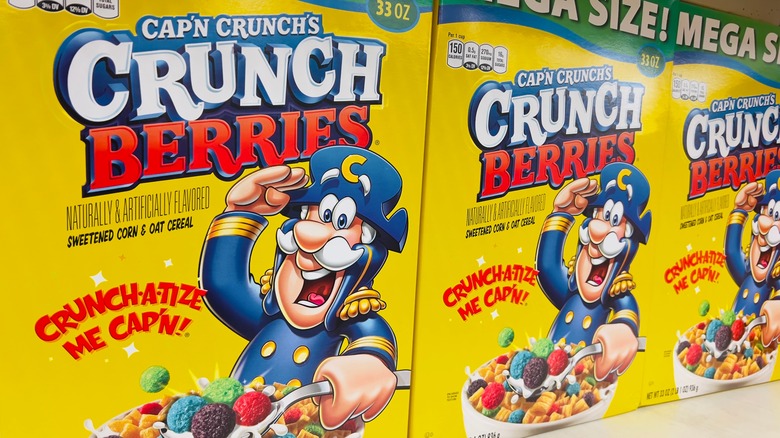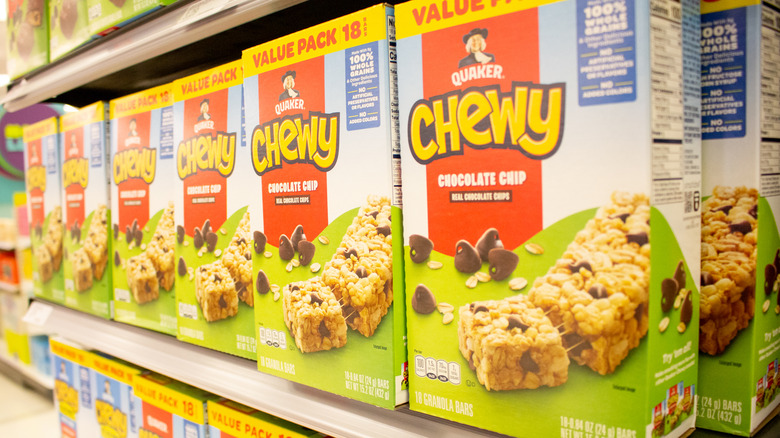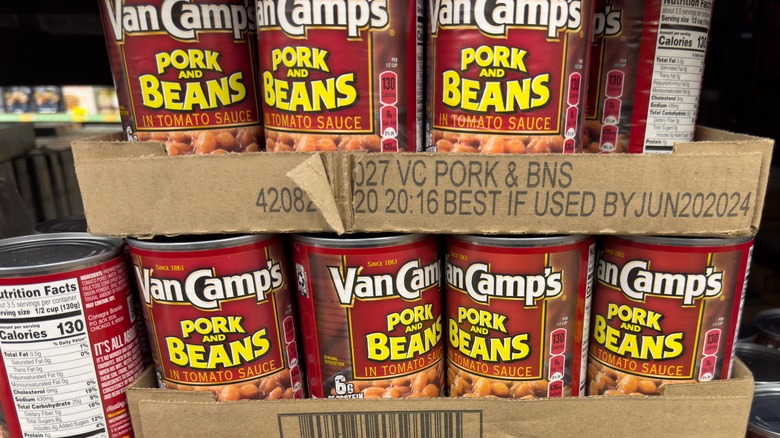The Biggest Food Recalls In Quaker Oats History
We may receive a commission on purchases made from links.
Quaker Oats' decision to pull certain granola-based products from store shelves across the country in December 2023 was, at least as of this writing, the biggest recall in the company's history. But unsurprisingly, it was far from the first time the brand had to recall a food item. For a company like Quaker Oats, with roots that date back well over a century to 1877 when its name was first trademarked on cereal, at least one food product recall may well have been an inevitability over the course of such a lengthy existence.
That said, more than just a few items have been recalled by Quaker Oats since food businesses in the U.S. started pulling products from shelves as part of official recalls that began in the 1970s. Food recalls generally fall under the oversight of the U.S. Food and Drug Administration, unless they involve meat, poultry, or processed egg products (those recalls are handled by the U.S. Department of Agriculture).
The following is a list of some of the most impactful and widest-reaching Quaker Oats food product recalls in the history of the brand owned by Pepsico, from a cereal scare in the '90s to the one that started last year and expanded to encompass dozens of products. Naturally, some cases are more severe than others. Nevertheless, this list covers all of the biggest food recalls in the history of the Quaker Oats company, in reverse chronological order.
A salmonella scare caused a series of recalls in 2023 and 2024
The most recent food recall for Quaker Oats is actually a three-parter. The discovery of a potential risk from salmonella contamination prompted a recall in December 2023 involving about 40 granola-based products, including Chewy bars and some cereals. Products were distributed not just to all 50 U.S. states but to Puerto Rico, Guam, and Saipan as well. The recall's scope expanded significantly in January 2024 to include nearly two dozen other products, including more granola bars, some cereals, cereal bars, a protein bar, and a snack mix. Later that month, Quaker Oats added one more granola bar to the list. Beyond being a landmark moment for the company, it became one of the biggest food recalls for Target, which sold many of the products.
Such a widespread recall ended up causing significant repercussions for Quaker Oats. First, the company's operating profits dropped, according to an earnings call, while certain expenses rose amid efforts to bounce back from the situation. In April, Quaker Oats confirmed that it would close the Illinois-based plant that was purported to be the source of the salmonella contamination. That plant had operated for about 65 years and employed more than 500 people. For what it's worth, there have been no reported illnesses resulting from salmonella in a Quaker Oats product, suggesting that the recall successfully mitigated any potential harm.
Quaker Oats recalled a rice cake flavor over allergy concerns in 2021
In early 2021, Quaker Oats initiated a recall of a specific flavor of its rice crisps — bite-sized rice cakes that might serve as an alternative to potato chips. As it turned out, the company determined that snack-sized bags of its Sweet Barbecue Rice Crisps might contain soy ingredients, which the packaging failed to mention. Since undisclosed soy might pose a risk for customers with soy allergies or sensitivities, Quaker Oats decided to institute a voluntary recall of the product. This was not an altogether surprising determination, given that items with undeclared allergens account for some of the foods most likely to be recalled. Of course, in these sorts of cases, the product remains safe for anyone lacking an allergy to the offending ingredient, but the risk that it might unexpectedly trigger an allergy is enough to necessitate a recall.
The distribution area for the recall covered 21 states and involved 4,550 bags of Sweet Barbecue Rice Crisps. These days, the ingredients list on the Sweet Barbecue Rice Crisps packaging is absent any soy products. It's unknown whether there was an error in production or a packaging gaffe or a change in the product's recipe that led to the recall. No illnesses were reported.
A salmonella scare came to light in 2018
The 2023-24 product recall wasn't the first time Quaker Oats has had to take action due to the risk of salmonella. Another instance occurred in 2018, when the company instituted a recall of the Peanut Butter Crunch flavor of its signature Cap'n Crunch cereal. It's worth noting that this recall affected only five stores in three states. Nevertheless, the seriousness of the risk necessitated a recall all the same. People exposed to the salmonella bacteria can become ill and develop stomach cramps, diarrhea, and fever. Certain populations, such as young children, people over age 65, and those with other health issues, may be at greater risk of more severe illness.
In total, the 2018 recall affected Target stores in Omaha and Lincoln, Nebraska, and Wichita, Kansas, as well as P-Fresh stores in St. Louis and Blue Springs in Missouri. Furthermore, it was only 21 boxes of Peanut Butter Crunch Cap'n Crunch cereal produced during a specific period of time that were determined to be at risk of carrying salmonella. Quaker Oats was able to isolate the salmonella danger to that particular batch of cereal thanks to a sample taken at some point during the production process. This sort of sampling is a regular occurrence and presumably how the company is able to catch potential contamination risks in other cases. Thankfully, not one sickness resulting from a Peanut Butter Crunch Cap'n Crunch box carrying salmonella was reported.
Listeria risk led to a granola bar recall in 2016
In 2016, Quaker Oats recalled two specific quinoa-based flavors of its granola bars over concerns that they might carry listeria. That possible contamination was traced back to a company that supplied Quaker Oats with certain ingredients. It had apparently distributed sunflower kernels that could have potentially carried the bacteria.
When Quaker Oats found out about the listeria risk, the company was able to withhold a significant number of the affected granola bar boxes from circulation. Nevertheless, a small quantity of Chocolate Nut Medley as well as Yogurt, Fruit & Nut flavors of the Quaker Quinoa granola bars with specific expiration dates were implicated. Since boxes of both relevant flavors were distributed nationwide, the recall had no geographical limitation despite what was otherwise a small scale.
Listeria infections, for what it's worth, can cause intestinal symptoms but if the bacteria spreads to other areas of the body, it can become fatal in certain individuals, so even if the volume of product posing a danger was limited, that danger wasn't insignificant. Ultimately, the recall came and went without any customers reporting illnesses resulting from listeria bacteria in a Quaker granola bar.
Undisclosed allergens caused a product recall in 2011
Before Quaker Oats decided to recall its Sweet Barbecue Rice Crisps in 2021 over undisclosed allergens, another shade of this same issue resulted in a product recall around September 2011. The recall involved an eight-count box of Quaker Chewy Smashbar Graham Pretzel bars. While the company didn't provide a specific number of boxes affected by the recall, those with 13 distinct best-before dates were implicated.
The offending bars lacked text on the packaging that disclosed the possibility that they contained milk. Further necessitating the recall was one reported case of an adverse reaction from a customer with a milk allergy who promptly underwent treatment for their allergic reaction. Specifically, what Quaker Oats had failed to do was include the text "may contain milk" on the product's packaging. For what it's worth, such statements are voluntary and indicate a risk of allergens rather than a guarantee that a product will contain the listed allergen.
Salmonella concerns led to a pancake mix recall in 2008
The first time Quaker Oats instituted a product recall over the risk of salmonella was in 2008. In this case, it was three Pancake & Waffle Mix products from its Aunt Jemima brand (which, by the way, rebranded in 2021 to become the Pearl Milling Company) that were determined to potentially carry the bacteria. Included in the recall were Original, Original Complete, and Buttermilk Complete flavors of the Pancake & Waffle Mix, sold in both 2-pound and 5-pound quantities.
As has been the case with similar product recalls, it wasn't every box of the three types of pancake mixes but only boxes produced during a certain period of time that were found to be a potential danger. Customers could determine whether a product fell within the purview of the recall based on its best-before date. Quaker Oats did report pulling a majority of the affected pancake mix boxes from circulation at the factory before they hit store shelves. The company estimated that roughly 1,000 boxes had been distributed to stores in 17 states that could potentially carry bacteria, prompting the official recall. That said, a statement the company published on its website at the time said the risk was limited to consuming the pancake mix raw or after cooking it for less than the recommend amount of time.
Allergen risk caused an oatmeal recall in 2003
In 2003, Quaker Oats decided to recall 16-ounce boxes of a Quaker oatmeal flavor the company produced at the time called Brown Sugar Bliss. Necessitating the recall was the failure to declare that the product may contain almonds as an ingredient. Since this flavor is no longer in production, it's unclear whether almonds were an intended ingredient lacking representation on the oatmeal's packaging or mistakenly added to this particular oatmeal product's recipe.
The affected boxes of Brown Sugar Bliss oatmeal were all produced at one plant in Sparks, Nevada, so it's also possible that equipment used in this oatmeal flavor came in contact with another product that did contain almonds. The recall covered about 23,000 cases of that oatmeal flavor distributed across the country with best-before dates limited to three days in September. Customers were encouraged to throw away the affected products and apply for a refund.
Almonds are one of several varieties of tree nuts that can cause allergic reactions in some people. While different that peanut allergies, tree nut allergies can also cause severe symptoms. Anywhere from 70% to 90% of anaphylactic deaths involve a reaction to either peanuts or tree nuts, according to a 2018 review in the Journal of Asthma and Allergy.
Concerns over allergens also led to a recall in 2002
Quaker Oats' recall of Brown Sugar Bliss oatmeal marked the company's second recall over an allergen risk in two years. In 2002, the recall involved Apple Cinnamon Quakes, a crispy rice-based snack product that is no longer in production.
The company estimated that there were only about 50 to 100 cases of Quakes in circulation that needed to be recalled. At fault was the presence of a dairy product in the snack's flavoring component that somehow made its way into that batch of Quakes without proper labeling, though nobody reported any sort of allergic reaction. Given the small size of the batch, which was identifiable by a single best-before date, the presence of dairy in those Quakes bags seems to have been an error, as opposed to their packaging failing to mention an intended ingredient. In addition to encouraging consumers to return bags of Quakes implicated in the recall to the store from which it was purchased, Quaker Oats likewise urged stores to take the bags in question off of shelves.
Quaker Oats recalled boxes of a few cereal brands after a toy injured children in 1993
Prior to the 2000s, the reasons behind some of the recalls issued by Quaker Oats were of a markedly different nature than the scares over allergens or bacterial contamination. In 1993, Quaker Oats had to recall boxes of three different types of Cap'n Crunch cereal after a toy injured multiple children.
The three cereals in question were Cap'n Crunch, Crunch Berries, and Peanut Butter Crunch. The offending toy, included in about 8.3 million cereal boxes distributed nationwide, was a sort of hollowed out half-sphere made of rubber called a popper. Used as intended, kids could invert the piece of rubber and place it on a hard surface. After a few seconds, it would snap back into its original shape, propelling itself into the air. However, some children opted to press the toy onto their faces or their eyes rather than a flat surface. Reported injuries ranged from bruises to bloodshot eyes. In total, 36 kids were injured before the cereal company recalled boxes of Cap'n Crunch and spinoff cereals containing the rubber toy. Parents who had already purchased boxes of cereal containing the toy were urged to throw the toy away. The company specified that the cereal itself was still safe to eat.
Safety hazards are just one of the reasons that a lot of companies have stopped including toys in cereal boxes. Plus, the cheap toys just don't have the appeal they once did.
Fears over granola bars containing metal resulted in another 1993 recall
Quaker Oats' cereal recall over the danger that its jumping rubber toy posed to children wasn't the company's only recall in 1993. About a month and a half prior to the toy debacle, Quaker Oats recalled a batch of Chocolate Chip Chewy granola bars. Rather than undeclared allergens or potentially harmful bacteria, the impetus for this decision was the possibility that the batch of granola bars at issue might contain pieces of metal. The source of the metal was not specified, but the danger that unexpected metal particulates in a food product might cause was plenty clear.
In total, the recall's scope covered 1,600 cases of Chocolate Chip Chewy bars that were sent to stores in California, Massachusetts, Connecticut, New York, New Jersey, and Rhode Island. For what it's worth, at the time Quaker Oats issued this recall, the company claimed that the boxes of granola bars potentially containing metal fragments were likely not yet stocked on store shelves. It's possible, then, that some of the stores receiving boxes of the recalled product were able to return them before customers could even get their hands on any granola bars containing metal. There had been no customer complaints as of the time the recall was announced.
Canned beans were subject to a recall over insufficient processing in 1991
What appears to have been the earliest Quaker Oats food recall based on present-day public records was an instance in which the company recalled cans of beans and chili produced by then-subsidiary Stokely-Van Camp Inc. In total, 11 products under both the Van Camp's and Wolf labels were subject to the nationwide recall, ranging from the Van Camp's signature pork and beans product to Wolf brand chili with beans.
The issue with those batches of canned beans and chili was an error at some point in the processing that was normally intended to prevent food spoilage in the relevant products. Due to insufficient exposure to heat, according to a company official at the time, those cans of beans were more likely to swell and develop harmful bacteria. The problem was discovered during a routine check at a manufacturing plant in Dallas.
Customers at the time could identify whether or not a can of beans was a part of one of the relevant batches based on an alphanumeric product code. The company decided to take action before any illnesses were reported, and it seems that there were ultimately no illnesses from the cans of beans that lacked proper processing. Van Camp beans and Wolf Brand Chili remain in production to this day, but neither brand is currently owned by the Quaker Oats company.
